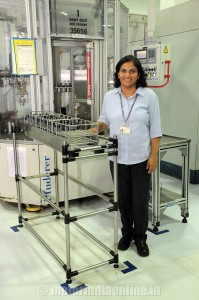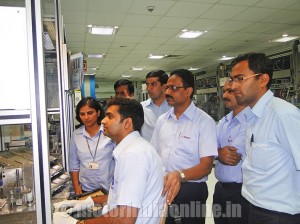Celebrating a day in the name of a gender, a relationship or an emotion is merely about playing to the gallery owned by brands and ad campaigns. But what comprises a responsible adult’s – whether of any gender – and an evolved company’s every-day work ethics are professionalism, productivity, making a difference, quality and honesty.

MOTORINDIA was invited to meet Saritha Poovanna, General Manager – Engineering & Manufacturing – Common Rail Pump, Bosch, in Bangalore on the occasion of the International Women’s Day, celebrated every year on March 8 globally, and it is true that the aura of womanhood cannot be limited to a day’s celebration.
What’s gender got to do with it? Organizations like Bosch are making progressive, gender-neutral policies to create harmonious and competitive work environment to boost their employees’ excellence and create collective successes. It helps the company realize a professional to be a professional – one who is not guided by the gender. If a brilliant employee happens to be a woman and is capable of heading a traditionally male-dominated area of work, then she shall head the department!
Meet Ms. Saritha Poovanna, a 37-year-old Bangalore-based industrial engineer. She agrees: “It’s about how we show our strengths, and how we utilize them. The people who are responsible for our careers are ourselves.” When girls her age chose careers in electronics, telecom or computer science, Saritha preferred industrial engineering and management, “There is always scope here in improving productivity, in quality, and you have many projects to handle. If you are the kind who grabs a challenge and really wants to do it, then this is it.” In total, Saritha has been with Bosch for the last 16 years or so in different capacities.
Non-existent glass ceiling
The glass ceiling was broken down long back. If at all it exists, it does so only in the psyche of individuals – both men and women. Ms. Saritha shares: “Common Rail Pump is a new generation product and I was happy that I got it. But I did wonder as to how the acceptability will be because people there have seen only men around as bosses.”
Heading a team, with experience spanning from one year to 30 years, she knew that her associates will take it upon themselves to advise her since she was new to the manufacturing department, of course with all good intentions at heart, and may not feel that she means business.
So how did Ms. Saritha handle it? “By being really open and by being objective to the way you are treating them, making it clear that you don’t want any special treatment because you are a woman, by definitely being very firm when you need to be firm. I was clear that none should be soft with me because I am a woman.”
Did the team get rankled when she became the boss? She says: “There have been times when my team members really had disagreed with me very loudly in a group. I held my composure, and then we just got down to doing what we had to do. I was always black and white when things had to be said that way. But it is crucial to create a rapport with the associates and exchange experiences continuously and ensuring that their suggestions of improvement are implemented.”
Breaking down clichés
Though, Ms. Saritha is the only woman working in her department, Bosch’s official statement says: “The share of women at acquisition stood at 27 per cent in 2013 which increased by 4 per cent in the last two years.”
So, is it true that manufacturing and engineering department is male-dominated? Ms. Saritha says: “From a number’s perspective, it might be. I think this male dominated thing is a created hype because it’s totally up to women to a large extent to prove that it is not only males who can do a job like this. Some of the associates who are older and have been here for more than 20 years say that they never thought there would be a woman in manufacturing. So they feel it as well but now they know it is possible.” Ultimately, it is the capability that matters.
Ms. Saritha was inducted into Bosch fresh from college. She literally grew with the company. Professionally, she learnt her basics here, received promotions, took up a 14-month training in Germany to learn Bosch Production System while simultaneously in personal life, she was married and has two children. Balancing two full-time roles – one as a mother and wife, and the other as a career woman, according to her, could happen because of her two support systems – her family and Bosch’s work policies and supportive colleagues.
While her family had always supported her career choices, as a company Bosch has made its work-life policies flexible and favourable to employees. Ms. Saritha shares: “It’s inevitable that you have to compromise somewhere. It’s about how well people are supporting you and that’s been really great both at work and at home. I have two children. My daughter is four and my son 11. I had to go for a specific system expert development to Germany when my son was only three and a half but my husband and my mother-in-law supported me.”
Bosch’s work policies, in general, are gender-neutral. Saritha shares, “Our work-life policy allows us to opt for part-time work or working from home. The five and a half working days in our plant has been changed to alternate Saturdays working because people were spending much time on commuting to spend a half day here. Another change was that the employees could choose either half of the day to take leave, which was not so earlier,” she comments.
The number of people working with Bosch in Bangalore in 2013 stood at 11,352, and the attrition rate is well below the market levels, according to the official statement.
Challenging comfort zone
The way Ms. Saritha worked out Bosch’s KPI Tree or Key Performance Indicator Tree for the Bangalore plant while doing her regular work or helping shift a production line of Common Rail Pump in preparation of Bosch relocating from Bangalore to Bidadi, was a bid by Saritha to prove to herself that she can always challenge her comfort zone, “We had machines coming in from other Bosch plants directly to Bidadi. It needs us to be absolutely hands-on because many people from different departments have to work together.”
But what remains the biggest challenge for Ms. Saritha is balance. She says: “It’s tempting to get involved more than I am. But I control it because it is extremely important that the next level is developed to handle work, to make them responsible and accountable to empower them. On the other hand, you need to make sure that things are going fine at home too and you want to give more time than you are.”
Definitely, with Bosch and Ms. Saritha celebrating womanhood and working towards proving the phrase ‘male-dominated industry’ to be redundant is a matter that is taken seriously every day because it is all in the grey cells ultimately.
